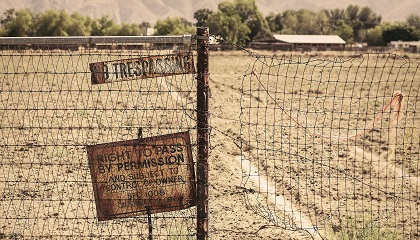
In light of recent events across Australia by activist groups, land owners must be aware of their rights against trespassers. A failure to properly understand these rights could see a land owner falling afoul of the law themselves.
As a starting point, you should make it clear that your property is private. This generally isn’t a major concern in built-up areas where it is relatively easy for an ordinary person to ascertain what is public land and what is a private land or building. For rural properties though, we recommend that fencing is in place and in good condition, as it clearly communicates an intention to restrict movement to and from a property. Designated access points should be clearly accompanied by a sign stating that a person is about to enter private property and that access is permitted to bona fide persons only.
Regardless of property type, if there is an activity occurring on your property that could pose a health risk then this should be clearly communicated by signage. Examples of this could be welding, use of heavy machinery, or storage of chemicals. You should consider directing all visitors to a relevant person or location for biosecurity purposes, if relevant. This recommendation is to potentially reduce your liability in case of personal injury.
For reasons that will become apparent in the next paragraph, if you are a business, you should give your employees express authority to request a trespasser to leave the property.
If a trespasser enters your property, you should call police immediately. While you are waiting for them to attend, you should (if comfortable and safe to do so):-
* Identify your position in relation to the property (e.g. as the land owner or an employee of the land owner). If you are an employee of the property owner, you should state that you have been given authority by the property owner to do the following;
* Advise the person (s) that they are not permitted on the property; and
* Direct the person(s) to remove themselves and their possessions from the property immediately.
You cannot use force to remove a trespasser from your property. You should not touch a trespasser or any of their possessions (including any photography or filming equipment of theirs). You have a right to self-defence if you are attacked, however this right should be used with extreme caution. Any kind of self-defence must be proportional to the attack. Similarly, you can only do what is reasonably necessary to protect yourself, and nothing further. Any action beyond this is likely to be considered assault, and you could be charged with a criminal offence or face civil penalties. If a situation is turning violent, you are far better to remove yourself (if safe to do so) rather than reacting in the heat of the moment.
Under no circumstances should you brandish a weapon, or make threats that involve weapons or violence. Again, you could find yourself charged with a criminal offence or facing civil penalties. You should remain firm but calm when engaging with a trespasser.
Once the trespassers have vacated your property, you should disengage with them completely to avoid tensions escalating further.
You are at liberty to record any conversation you have with a trespasser, whether by video or audio. We strongly recommend that you record all interactions with a trespasser in full, especially any direction given for them to leave the property. You could use the opportunity to attempt to identify the trespassers as well as the registration number of any vehicles they have arrived in. Consideration should be given as to whether installation of a surveillance system would be worthwhile. If a business, you may have obligations under the Privacy Act 1988 (Cth) that need to be adhered to in respect of the footage.
As far as penalties are concerned, it is up to police whether they charge a trespasser with a criminal offence or not. If a trespasser causes loss or damage to you (e.g. damage to your property or livestock), then there are civil remedies available to you, but if you cannot accurately identify the offending party or if the loss or damage is of a relatively low value, then it may not be worthwhile pursuing. There are proposals for certain trespass offences to be introduced, but at time of writing, none have been made as law.
If you are an employer – especially if your business is of a type being targeted by activists – you should have formal systems and procedures in place to deal with trespassers. If you do not have these systems in place, communicating the above information to your employees should be taken as an interim measure.
It should be noted that some persons – such as Council staff and Police Officers – will have a legislative right to enter your property for certain purposes, and for as long as they are complying with these purposes, you cannot ask them to leave.
Our lawyers have a particular interest in property law and rural matters. Contact us if we can be of assistance to you.
This post is general information only. It is not a substitute for legal advice from a lawyer. If you have a legal issue, you should always contact your lawyer to obtain advice that is relevant to your circumstances.

